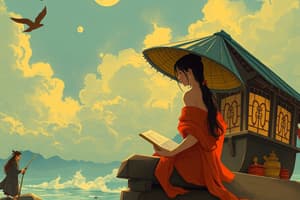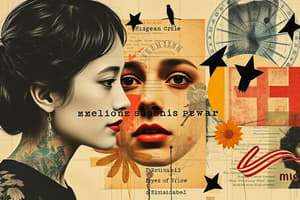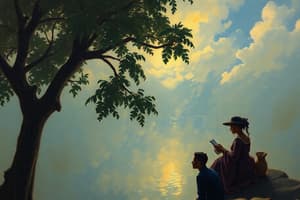Podcast
Questions and Answers
What is the primary function of literature according to Aristotle?
What is the primary function of literature according to Aristotle?
- To document historical events
- To entertain the reader
- To evoke catharsis through emotions (correct)
- To teach moral lessons
Literature is only focused on expressing historical events and does not reflect personal experiences or emotions.
Literature is only focused on expressing historical events and does not reflect personal experiences or emotions.
False (B)
What are tales often referred to as in literature?
What are tales often referred to as in literature?
myths and legends
An example of an epic is __________.
An example of an epic is __________.
Match the literary forms with their descriptions:
Match the literary forms with their descriptions:
What were the main themes of literature during the Spanish-Colonial period in the Philippines?
What were the main themes of literature during the Spanish-Colonial period in the Philippines?
Cenaculo is a type of literature that depicts the life and sufferings of Muhammad.
Cenaculo is a type of literature that depicts the life and sufferings of Muhammad.
What is the Filipino term for proverbs?
What is the Filipino term for proverbs?
The narrative poem about the life of Jesus Christ sung during the Lenten season is called __________.
The narrative poem about the life of Jesus Christ sung during the Lenten season is called __________.
Match the following literary forms with their descriptions:
Match the following literary forms with their descriptions:
Flashcards
Local Songs
Local Songs
Traditional songs that reflect the cultural heritage of Filipinos.
Tales (Myths/Legends)
Tales (Myths/Legends)
Creative stories that explain the origins of things, often supernatural.
Epics
Epics
Long poems that celebrate the heroic feats, adventures, and misfortunes of a brave, courageous hero.
Catharsis
Catharsis
Signup and view all the flashcards
Mimesis
Mimesis
Signup and view all the flashcards
Proverbs (Salawikain)
Proverbs (Salawikain)
Signup and view all the flashcards
Riddles (Bugtong)
Riddles (Bugtong)
Signup and view all the flashcards
Cenaculo
Cenaculo
Signup and view all the flashcards
Pasyon
Pasyon
Signup and view all the flashcards
Spanish Colonial Period Literature
Spanish Colonial Period Literature
Signup and view all the flashcards
Study Notes
Pre-Colonial Literature
- Literature records human experiences, thoughts, and feelings.
- It's a systematic expression of life through language.
- Literature imitates life (mimesis) to evoke emotional cleansing (catharsis).
- It embodies culture, tradition, and human nature.
- Proverbs (salawikain) are simple, traditional sayings offering wisdom about life.
- Riddles (bugtong) are playful statements with hidden meanings.
- Folksongs (traditional songs) are passed down generations.
- Tales/Myths/Legends explain origins of things.
- Epics are long poems narrating heroic deeds and adventures.
Spanish Colonial Period Literature
- A significant shift in literary form occurred in the Spanish colonial era.
- Literature focused on Christian values and beliefs.
- Spanish language became the literary language.
- Cenaculo is a play depicting the life of Jesus Christ.
- Pasyon is a narrative poem about the life of Jesus Christ, sung during Lent.
- Awit is a narrative poem about the life of Jesus Christ, often sung during Lent.
Literary Forms in Philippine Literature
- Zarzuela is a form of musical comedy, often satirical.
- Corrido are narrative songs about oppression, history, and society.
- Moro-moro (Comedia de Capa y Espada) is a blood-and-thunder melodrama depicting conflicts between Christians and Muslims.
- Carillo is a play using shadows to project figures.
- Tibag stories reenact the search for the Holy Cross.
- Duplo/Karagatan are dramas tied to Catholic mourning rituals and harvest celebrations.
Representative Authors and Texts
- Jose Rizal: A polymath who wrote and advocated for Filipino rights.
- Francisco Balagtas: Known for "Florante at Laura," a narrative poem.
- Nick Joaquin: Wrote about Philippine history, identity, culture.
- Lualhati Bautista: Focused on Filipino women's lives and social issues.
- Virgilio S. Almario/Bienvenido Lumbera, key figures in literary criticism.
- Nestor Vicente Madali Gonzales: A leading Filipino writer in English, known for his mastery of the Filipino experience.
- Maximo D. Ramos: Known for folklore studies and contributions to Philippine folklore and regional literature.
- Felipe Landa Jocano: Significant figure in Philippine cultural anthropology, documented and translated the "Hinilawod".
- Leoncio P. Deriada: "Father of Contemporary West Visayan Literature" known for novels, plays, and poems.
- Peter Solis Nery: Multi-awarded poet, fictionist, and playwright.
- John Iremil E. Teodoro: Pioneers in Philippine gay literature, multi-awarded poet and playwright(and university professor).
- Santiago B. Villafania Focused on Mindanao and regional themes in literature.
- Norma L. R. Rojas: Writer, educator, journalist whose work centers on ordinary people in Mindanao.
Studying That Suits You
Use AI to generate personalized quizzes and flashcards to suit your learning preferences.




